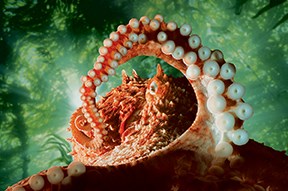Though the octopus is more elusive compared with other marine life in Howe Sound, it is a highly intriguing and magnificent creature, according to Ruby Banwait, senior aquarium biologist at the Vancouver Aquarium.
“They are amazing,” she said. “They are beautiful, beautiful animals.”
One of the most interesting things about octopuses is that they are relatively intelligent.
They can learn and process new things and have a crazy ability to problem solve, Banwait said.
They are more “people-like and relatable” than many animals, according to Banwait.
Though octopuses are colour blind, they have well-developed eyesight.
Banwait said looking into the eyes of the octopuses she has worked with at the aquarium, she felt there was a level of recognition not found in some animals.
“I know they are processing information about me too,” she said.
Howe Sound is home to both the giant Pacific octopus — which is the largest of the species, measuring up to 9.75 to 16 feet — and the Pacific red (ruby) octopus, which is smaller at about 20 inches.
The giant octopus lives to between three to five years while the red octopus lives for about two years.
“They live hard and fast lives,” Banwait said.
They die after breeding, though the female lives long enough to tend to her eggs, Banwait said.
Earlier this month, the aquarium transferred a female giant Pacific octopus to the waters off of Bowen Island because she was reproductively active.
Another fun fact about the octopus is that a single sucker can lift 30 pounds, and they have a lot of them, Banwait said.

Though they can’t see colour, they can change their skin colour to match their surroundings.
It is not clear how many octopuses are in Howe Sound.
Banwait said though spotting one is rare because of their depth below the ocean and ability to blend in, octopus dens are more identifiable.
They are very “tidy,” and so after they eat crab, for example, they pile all the debris outside their den. Find the pile, you have found an octopus den, most likely.
She partially credits the octopuses’ ability to find areas that are suitable for habitat for their survival over hundreds of years.
Another cool fact about them is that they play.
“They are just fascinating to me,” said Banwait, adding knowing people enjoy eating them puzzles her as much as someone eating a pet would.
They can also squeeze their bodies through any space big enough to fit their hard, parrot-like beaks.
While divers should be on guard around octopuses in Howe Sound because they are curious and may try to attach to masks or regulators, they are actually quite shy creatures to be admired, not feared, she said.



